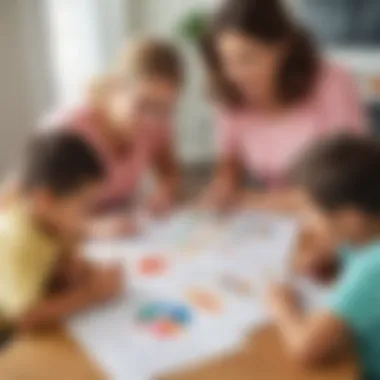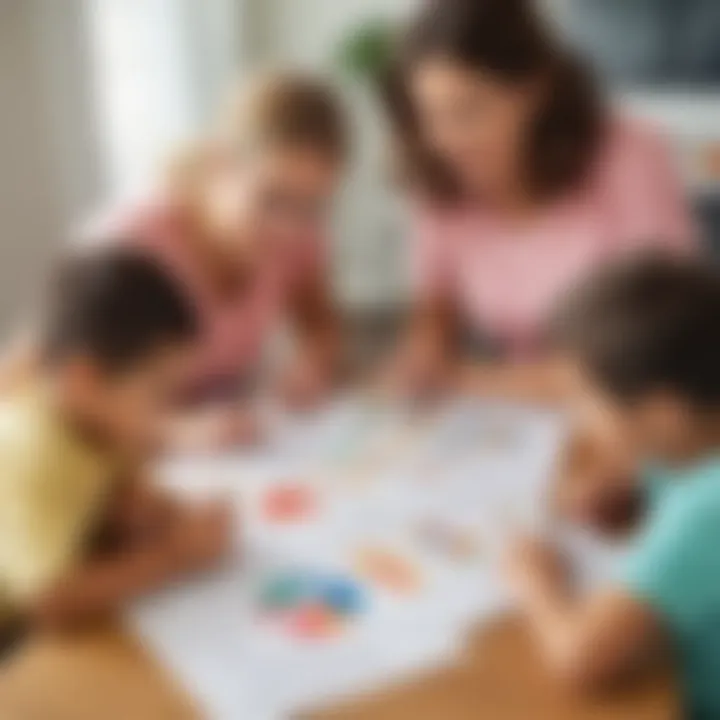Engaging Printable Math Games for Kindergarten Learners


Intro
In recent years, educational tools have evolved to support younger children in developing foundational skills in mathematics. Among these tools, printable kindergarten math games have gained attention. They are not only engaging but also serve as effective ways to cultivate a child's mathematical abilities. The importance of hands-on learning cannot be understated; children often grasp concepts better when they can manipulate materials or participate in games. In this article, we will explore various types of printable math games, their benefits for early learners, and how they can be effectively used in educational settings.
Creative Activities
Creative activities play a crucial role in the early learning process. These activities can captivate children's attention while allowing for the development of essential skills. Engaging in hands-on tasks inspires curiosity and promotes a love for learning.
Craft Ideas
Craft ideas that relate to math concepts can serve to reinforce learning while encouraging creativity. For instance, creating number flashcards from colored paper allows children to practice counting. Children can build their own manipulatives, such as counting beads on strings, which can directly tie into their understanding of numbers.
Step-by-Step Guides
To ensure that educators and parents can effectively implement these activities, detailed instructions are necessary. For example, a simple activity might involve:
- Gathering materials like paper, scissors, and markers.
- Cutting shapes or numbers out from the paper.
- Having children color them and organize them into groups based on size or number.
- Encouraging discussions about the different shapes or numbers they created.
This structured approach simplifies the learning process and ensures children remain engaged.
Educational Value
Participating in creative math activities not only helps with understanding basic concepts but also enhances fine motor skills. Children learn how to recognize patterns and quantities as they create, thus reinforcing their mathematical knowledge in a fun way.
Fun Quizzes
Quizzes can be an effective method for reinforcing knowledge in a low-pressure environment. Printable quizzes can cover various math topics.
Quiz Topics
These quizzes might include subjects like:
- Basic addition and subtraction
- Recognizing shapes
- Understanding simple patterns
Question Types
Engaging children through various question types ensures learning remains dynamic. Multiple-choice questions, fill-in-the-blank style, and matching activities can be used to maintain interest and challenge understanding.
Knowledge Reinforcement
Quizzes offered in a playful manner provide immediate feedback to young learners. This feedback is crucial for reinforcing previously learned material before moving on to advanced concepts. When children have fun while learning, they are more likely to retain information.
Fact-Based Articles
Fact-based articles can serve as valuable supplemental material for children as they learn new concepts.
Topics
A diverse range of topics can be covered in these articles, from basic number recognition to understanding the significance of math in real-life situations. Topics that relate to children's daily life can make learning more relevant and interesting.
Engaging Content
Articles written in a clear and engaging style help children to grasp more complex math ideas without feeling overwhelmed. It is essential to present information that is accessible and tailored for their developmental level.
Prelude to Kindergarten Math Games
In the rapidly evolving educational landscape, kindergarten math games serve as a crucial tool for fostering early mathematical skills. These games combine learning with play, which is essential for young children's development. They not only make mathematics enjoyable but also contribute to cognitive growth. Early learners benefit greatly from engaging activities that simplify complex concepts into manageable parts, making it easier for them to absorb information.
Importance of Early Mathematical Skills
Establishing strong mathematical foundations in kindergarten is vital. Young children who develop proficiency in basic math are more likely to excel in future academic endeavors. Early mathematical skills include number recognition, counting, and understanding simple operations like addition and subtraction. These skills set the stage for more advanced mathematics in later grades.
Moreover, mastering these early skills promotes critical thinking and problem-solving capabilities. A solid grasp of mathematical concepts enhances a child's confidence, which can lead to increased participation in classroom activities. Children who experience success in math at a young age are more likely to maintain a positive attitude towards the subject throughout their academic journey.
Role of Games in Learning
Games have a significant role in learning, particularly in the context of early childhood education. They provide a dynamic way to engage students, transforming theoretical concepts into practical applications. When children play math games, they often do so in collaborative settings. This encourages social interaction, which is crucial for their emotional and intellectual development.
Additionally, games stimulate motivation. The competitive nature of gameplay captivates attention and keeps children focused on tasks that might otherwise seem mundane. By integrating math into games, educators can present challenges that lead to lasting comprehension instead of superficial memorization.


Types of Printable Math Games
Understanding different types of printable math games is crucial for enhancing young children's mathematical skills. These games offer diverse approaches to learning, each catering to varying learning styles and preferences. By selecting the right types of games, educators and parents can foster a love for math while improving essential skills. Printable math games serve as accessible resources that make learning enjoyable and interactive, facilitating a deeper understanding of mathematical concepts.
Board Games
Board games are a classic way to introduce math concepts. They often incorporate counting, number recognition, and basic operations. Games like "Chutes and Ladders" or custom math-themed games encourage children to engage in friendly competition while learning. The excitement of rolling dice and moving pieces helps children grasp one-to-one correspondence, a foundational math skill.
When creating or choosing board games, consider the following:
- Clear objectives: Ensure that the math skills being practiced are well-defined.
- Age appropriateness: Games should be suitable for kindergarteners, fostering both enjoyment and learning.
- Collaborative play: Games that require teamwork enhance social skills along with math proficiency.
Board games effectively create an interactive learning environment that motivates young learners to practice essential mathematical skills in a fun, engaging manner.
Card Games
Card games can provide versatile and engaging math practice. Whether through matching numbers, creating sums, or developing strategic thinking, cards allow for creative gameplay. Classic games like "Go Fish" can be adapted to include math elements. For instance, players can collect pairs of cards that total a specific number.
The benefits of card games include:
- Flexibility: They can be played almost anywhere and with minimal setup.
- Variety: Different card games can target specific math skills, such as addition, subtraction, or even basic fractions.
- Social interaction: Playing card games promotes interaction, making learning more communal.
Each card game can be tailored to meet the learning needs of the child, providing ample opportunities for practice.
Puzzle Games
Puzzle games engage young minds and challenge them to solve problems through hands-on activities. These games can include number puzzles, logic puzzles, or shape-based games. Children learn to identify patterns, enhance spatial awareness, and develop critical thinking skills. Puzzles can also help reinforce number recognition or simple arithmetic.
A few key features of puzzle games are:
- Problem-solving: They encourage children to think critically and find solutions.
- Visual learning: Puzzles often engage visual learners through colorful designs and shapes.
- Motivation: Completing a puzzle gives a sense of accomplishment, motivating children to take on new challenges.
Using puzzles in combination with other game types adds variety and keeps children engaged in their learning.
Interactive Worksheets
Interactive worksheets are a modern approach to traditional learning methods. These worksheets can be printed and filled in by children, providing practice in various math skills. They often feature engaging visuals and activities that make learning more appealing. Concepts like counting, addition, and subtraction can be taught through exciting exercises and games outlined in the worksheets.
Key advantages of interactive worksheets include:
- Self-paced learning: Children can work at their own speed, enhancing their confidence.
- Immediate feedback: Many worksheets allow for instant correction or verification.
- Diverse activities: They can present a variety of exercises, from coloring to matching, appealing to different learning styles.
Incorporating interactive worksheets alongside other math games creates a comprehensive toolkit for early learners, ensuring a varied and effective learning experience.
Educational Benefits of Math Games
Math games serve multiple educational purposes that extend beyond mere entertainment. They become a primary method for young learners to grasp foundational mathematical concepts. The strategic integration of these games introduces a dynamic approach to learning. Children engage with math in a playful context, which often leads to higher retention rates and a more profound understanding of numbers and operations. Moreover, these games cater to various learning styles, making math more accessible for all children, regardless of their initial skill levels.
Enhancing Number Recognition Skills
One of the pivotal benefits of math games is their capacity to enhance number recognition skills. Activities such as matching games and bingo not only introduce numbers but also encourage repeat exposure. When children engage repeatedly with number cards or worksheets, they become familiar with their shapes and values. This process is essential in the early stages of math education. As learners identify numbers readily, they build confidence, laying a solid groundwork for more complex concepts later on.
Improving Problem-Solving Abilities
Math games provide an excellent platform for developing problem-solving abilities. Many games require children to think critically and apply logical reasoning. For example, puzzle games often involve identifying patterns or completing sequences. As children navigate these challenges, they learn to approach problems strategically. The inherent trial-and-error approach in games promotes resilience and adaptability—qualities that serve children well in both mathematic tasks and real-world scenarios. As they advance, children begin to recognize the importance of testing different solutions, a practice that fosters deeper cognitive development.
Fostering Collaboration Among Peers
Collaboration is another significant benefit of implementing math games in a learning environment. Whether through board games or group worksheets, children learn to work together towards common goals. This teamwork encourages communication skills and social interaction, essential components of early childhood education. When children collaborate, they share ideas, negotiate rules, and celebrate victories together. Such interactions not only enhance their math skills but also reinforce the importance of working cohesively with others. Through these shared experiences, children develop social bonds that can enhance their emotional well-being.
"Engaging in math games not only sharpens skills but also builds a community of learners eager to explore together."
Creating an Effective Learning Environment
Creating an effective learning environment is crucial for early education, especially in mathematics. A well-structured and stimulating atmosphere directly impacts how kindergarteners interact with new concepts. This section focuses on the factors that contribute to an enriching learning experience. A holistic approach to learning can enhance students’ engagement and retention of mathematical skills.
When children feel comfortable and motivated in their space, they are more likely to explore and engage with educational games. The layout of the learning area, the availability of resources, and the choice of materials can make a significant difference in their learning outcomes. It is essential to consider how each of these elements contributes to an environment conducive to exploration and growth. Additionally, incorporating elements that appeal to various senses can further enrich this environment, ensuring that all learners find some aspect that resonates with them.
Choosing the Right Games
Selecting appropriate math games is pivotal to maximizing educational benefits. It is important to focus on games that align with the learning objectives for kindergarteners. Before making a selection, educators should consider the developmental stages of their students. Games should introduce mathematical concepts like counting, number recognition, and problem-solving in an engaging manner.


Some factors to consider include:
- Grade Level Appropriateness: Ensure the games are suitable for kindergarten's skill levels. For example, avoid overly complex games that might frustrate young learners.
- Variety: Include a mix of game types, such as board games, interactive worksheets, and card games. This ensures students do not tire of similar activities.
- Engagement Factor: Choose games that are visually appealing and interactive. Bright colors and playful themes often attract young learners.
- Collaboration Opportunities: Look for games that encourage teamwork. These games help cultivate social skills while learning math concepts.
Choosing the right games can help provide students with a foundation of mathematical understanding that they will build on in future education stages.
Setting Up a Learning Space
The way a learning space is organized can influence children’s willingness to engage with math games. A well-thought-out setup not only fuels curiosity but also manages distractions. Here are several key considerations when establishing such spaces:
- Defined Areas: Create separate zones for different activities. For instance, have a quiet reading corner, a math games corner, and a collaborative area. This definition helps children understand where to focus on specific tasks.
- Accessibility: Ensure that materials and games are within reach for young learners. This autonomy encourages children to participate actively in their learning processes.
- Flexible Seating: Use various seating arrangements such as cushions, small tables, or carpets to facilitate movement and collaboration. Children learn better when they feel comfortable.
- Visual Aids: Decorate walls with number charts, shapes, and math-related posters. These visuals reinforce learning while creating an inviting atmosphere.
"A stimulating learning environment can effectively capture young minds and encourage a love for learning that lasts beyond the classroom."
Implementing Math Games in the Classroom
Integrating math games into the classroom is vital for early learners. These games address children's interest in play while helping them develop essential math skills. Math games make the learning process enjoyable and interactive. This approach improves students’ engagement and retention of the concepts taught. When implemented effectively, they can create a positive learning atmosphere.
Incorporating into Lesson Plans
When incorporating math games into lesson plans, it is crucial to align them with specific learning objectives. Decide on the key skills the lesson aims to develop. For example, a game focused on addition can enhance number recognition and basic arithmetic skills. To effectively integrate these games:
- Plan Ahead: Prepare the games before the lesson. Ensure that all materials are ready for use, which saves time and reduces disruption.
- Choose Appropriate Games: Select games that cater to the current topic being taught. Games should be age-appropriate and engaging for the students.
- Time Frame: Allocate specific time during the class for playing the games. This allows structure in your lesson while giving ample time for student interaction.
- Demonstrate How to Play: Spend a few minutes showing students how to play the game. Clear instructions lead to better understanding, preventing confusion during gameplay.
By following these steps, teachers can create a smooth transition from traditional learning to engaging gameplay.
Assessing Student Progress
Assessing student progress while using math games offers unique insights. Traditional assessment may not capture a child's growth and understanding as effectively as game-based assessments. Educators can monitor how students interact during the games. Observations during gameplay can highlight strengths and weaknesses in mathematical understanding. To assess progress:
- Observation: Take notes on students’ problem-solving approaches, communication skills, and teamwork during the games.
- Feedback: Encourage students to share their thoughts after playing. Discussions can reveal their understanding of the concepts.
- Integration with Tests: Combine game performance with traditional testing methods. This provides a well-rounded view of each student's capabilities.
- Adjust Methods: Utilize the insights gathered from games to adapt teaching methods for individual students. This tailored approach can target specific needs.
By effectively merging assessment with playful learning, educators can foster a deeper understanding of mathematical concepts.
Challenges and Solutions
Addressing challenges in the use of printable kindergarten math games is crucial for maximizing their educational potential. These obstacles often stem from the varied learning styles of children and the dynamics present in a busy classroom setting. By understanding these challenges, educators and parents can better implement strategies that cater to diverse learners, ensuring that math games remain an effective teaching tool.
Addressing Different Learning Styles
Children learn in different ways. Some may grasp concepts quickly through visual aids while others might need hands-on activities to connect ideas. Printable math games can be designed to suit these varying styles, but it requires careful selection and personalization. For example, children who are visual learners benefit from colorful graphics and illustrations in games. In contrast, kinesthetic learners thrive by physically arranging items or manipulating pieces in a game.
To effectively address different learning styles:
- Observe individual needs: Take note of how each child interacts with the games and identify their preferred learning style.
- Diversify game types: Include a range of games, such as board games that require moving pieces and card games that involve strategic thinking.
- Provide adaptable guidance: Offer instructions that can be tailored to individual learning preferences, ensuring every child can engage with the material meaningfully.
Managing Classroom Dynamics
Classroom dynamics can significantly impact how kindergarteners engage with math games. Factors like group sizes, student relationships, and classroom layout play a role in effective learning. Managing these dynamics is essential to create an environment conducive to learning.
One challenge is keeping students focused. Young children are easily distracted, which can hinder participation in math games. To combat this:
- Organize small groups: Smaller groups can promote active participation and collaboration among students, reducing distractions.
- Establish clear rules: Setting expectations before gameplay helps maintain order and encourages respectful interaction.
- Monitor actively: Actively walking around and observing can help teachers support students who may struggle with certain aspects of the game.
"Incorporating printable math games is not just about content delivery; it's about cultivating an environment where students feel motivated and empowered to learn."
By proactively addressing different learning styles and managing classroom dynamics, educators and parents can utilize printable kindergarten math games to their full potential. The challenges posed in this process present opportunities for creative problem-solving, ensuring that every child excels in their mathematical journey.
Resources for Printable Math Games
In the realm of educational resources, printable math games stand as essential tools for developing early mathematical skills in kindergarteners. These resources not only make learning engaging but also accessible. With the right materials, educators and caregivers can create a supportive environment that fosters early math development. This section dives into the specific resources available for printable math games and emphasizes their benefits.
Good resources can enhance the learning experience for children. They provide a structured approach that aligns well with early learning strategies. Moreover, these resources offer numerous advantages:
- Engagement: Learning through play naturally draws the children’s interest and keeps them focused.
- Accessibility: Printable games can be obtained easily online or from educational websites, making them widely available.
- Variety: Parents and educators can choose from a range of games tailored to different math concepts, ensuring all key areas of development are covered.
Online Platforms and Websites
A wealth of online platforms and websites cater specifically to printable math games for young learners. Here are a few noteworthy examples:
- Teachers Pay Teachers: This site provides a marketplace for educators to buy, sell, and share resources, including a vast array of math games.
- Education.com: Offers various printable worksheets and games that focus on key mathematical concepts such as addition and subtraction.
- Twinkl: Provides a plethora of resources for educators, including unique printable math games.
- Khan Academy: While more known for its instructional videos, it also offers interactive activities that can be printed.


"Printable math games help transform abstract concepts into tangible learning experiences."
These online resources are essential for anyone looking to supplement kindergarten math education. They can offer fresh ideas and targeted materials aimed at improving early math skills.
Educational Blogs and Articles
In addition to dedicated resource sites, various educational blogs and articles serve as excellent sources of information on printable math games. These platforms often provide insights not just on games themselves but also on methods to effectively implement them.
Some popular sources include:
- Scholastic Blog: Discusses techniques for incorporating math games into daily learning and includes links to printable resources.
- Pre-K Pages: Offers practical tips and hands-on activities for kindergarten teachers, including printable math games.
- The Measured Mom: Focuses on providing free printables and detailed descriptions of the educational purpose behind them.
These blogs and articles can also guide parents in how to approach mathematics at home. They reveal how simple games can empower learning and help build a strong foundation in math.
Utilizing these resources effectively can help maximize the educational potential of math games. In turn, this leads to improved learning outcomes and a more enjoyable learning process for children.
Feedback from Educators and Parents
Educators and parents play a crucial role in the learning journey of young children. Their perspectives on printable kindergarten math games provide valuable insights into the effectiveness and applicability of these educational tools. Feedback from both groups can inform the development and enhancement of these resources. Additionally, understanding their views can guide educators in selecting appropriate games that align with educational goals. This section delves into testimonials highlighting the effectiveness of these games, as well as suggestions for their improvement.
Testimonials on Effectiveness
Many educators report positive outcomes from incorporating printable math games into their teaching methods. Teachers highlight that these games actively engage students, making mathematical concepts more relatable and enjoyable. For example, a kindergarten teacher named Mrs. Smith noted:
"The students were excited to participate when we used games. Their number recognition improved significantly, and they actually looked forward to math time!"
Such testimonials are not isolated instances. Parents also provide insights regarding the academic progress observed at home. A parent, Mr. Johnson, shared his experience:
"My daughter has always struggled with math, but since we started using these games, her confidence has increased. She loves counting and can identify numbers easily now."
These accounts underline the substantial benefits these educational tools provide. Printable math games can significantly enhance engagement and improve foundational math skills. They often create an interactive atmosphere where children feel safe to experiment and learn.
Suggestions for Improvement
While feedback is largely positive, there are areas for improvement. Both educators and parents have shared insights on how to enhance the quality and effectiveness of printable math games. Here are some key suggestions:
- Diversity in Game Design: Some educators pointed out the need for a wider variety of games that cater to different learning styles and abilities. This ensures that every child can find a suitable game that resonates with them.
- Clearer Instructions: Certain parents indicated that a few games had instructions that were not easy to understand. Streamlining instructions could help adults set up the games effectively, leading to a smoother learning experience.
- Integration with Curriculum: Educators suggest that it would be beneficial to have games that align more closely with the specific curricula being taught. This integration allows for seamless transitions between game time and formal education.
- Enhanced Accessibility: Another recurring theme in feedback is the demand for more online resources and additional printables that can be accessed easily from home. Improving accessibility would enable families to extend learning beyond the classroom.
- Feedback Mechanism: Creating a structured way for educators and parents to provide ongoing feedback about the games themselves could improve future designs. Incorporating this feedback into ongoing development fosters a community-centered approach to educational tools.
Future Trends in Educational Games
The landscape of educational games, particularly for early learners, is changing rapidly. As these trends emerge, they offer valuable insights into how teaching methodologies evolve. Understanding these trends is crucial for educators, parents, and caregivers as they seek to enhance learning outcomes for young children. The future of educational games holds the promise of creating more engaging and effective learning experiences, transforming the educational journey.
Integration of Technology
Technology's integration in educational games is not just a passing phase; it is a significant trend reshaping how children interact with learning materials. Digital platforms now allow for printable math games to include technological elements, such as augmented reality and interactive touchscreens. These enhancements make the learning process more immersive and enjoyable.
For example, using tablets or smart boards, children can interact with math games that adapt to their learning pace. This adaptability is vital as it accommodates different learning styles, ensuring that each child receives tailored instruction. Moreover, technology can facilitate real-time feedback, allowing learners to understand their progress immediately. The use of applications that connect game elements with learning outcomes is becoming increasingly prevalent, supporting individualized learning paths.
Collaborative Learning Strategies
As educational practices evolve, collaborative learning strategies are gaining prominence. Collaborative games promote teamwork among kindergarten children. They encourage kids to work together to solve problems, fostering communication and social skills along with mathematical understanding.
Benefits of this approach include:
- Enhanced critical thinking
- Development of social abilities
- Better retention of concepts through shared experiences
Incorporating these strategies into math games can create environments where children not only learn math but also develop interpersonal skills. Teachers and parents can facilitate group activities and encourage discussions around strategies used in games. This kind of collaboration can reinforce the knowledge gained during play, making mathematics more relatable and enjoyable for children.
"Collaboration in learning fosters a sense of community among young learners, making education a shared journey."
In summary, the future trends in educational games highlight the importance of technology and collaborative learning. These elements are essential for creating an effective learning environment that engages kindergarten learners. By committing to these innovations, educators and caregivers can better prepare children for the complexities of math and beyond.
Epilogue
In this article, the exploration of printable kindergarten math games illustrates their paramount importance in early education. This section underscores the essential elements of utilizing games as tools for learning mathematical concepts. Mathematic skills formed at a young age set the foundation for future academic success. Notably, engaging in games not only enhances understanding but also cultivates a love for learning.
Recap of Key Points
To summarize, several vital points emerge from the discussion:
- Diverse Game Types: The variety of printable games such as board games, card games, and puzzle games cater to different learning styles, making math accessible and enjoyable.
- Educational Benefits: Math games enhance number recognition, improve problem-solving abilities, and foster collaboration among peers.
- Effective Implementation: Strategies to incorporate games into lesson plans ensure that such resources align with educational objectives, optimizing learning outcomes.
- Continuous Feedback: Insights from educators and parents highlight the effectiveness of these games, promoting ongoing adjustments for improvement.
"Math games can transform the mindset of young learners, making complex concepts simpler and more approachable."
Encouragement for Implementation
It is essential for educators and parents to embrace the use of printable math games in their teaching practices. Implementation should not be seen as an optional enhancement but rather a crucial aspect of effective early education. The benefits are clear: not only do these games make learning fun, but they also promote critical thinking and social skills among children. As such, consistent application of these games within both home and classroom settings can lead to significant advancements in early mathematical proficiency. The goal is to create a nurturing environment where children feel motivated to explore and understand math, paving their way toward lifelong learning.







